Shanny Campbell, ADB Country Director: Tajikistan Has One of the Best Performing Portfolios Across Asian Development Bank
Read also

DUSHANBE, 09.06.2023 (NIAT Khovar) – This year, Tajikistan and the Asian Development Bank (ADB) mark the 25th anniversary of cooperation.
On this occasion, a number of events are planned in Dushanbe.
As part of these events, ADB President Masatugu Asakawa is also scheduled to visit Tajikistan.
In honor of the 25th anniversary of cooperation between Tajikistan and ADB, Khovar state-run news agency interviewed Shanny Campbell, ADB Country Director in Tajikistan.
Khovar: How do you assess the cooperation between Tajikistan and ADB for 25 years?
Shanny Campbell: Tajikistan joined ADB in 1998. Our resident mission in Dushanbe opened in 2003. During the 25 years of our partnership, ADB has used its financial resources and technical expertise to help improve the lives of the Tajikistani people through restoring and building the country’s strategic transport and energy infrastructure, strengthening climate and disaster resilience, supporting social sectors, gender equality, expanding agricultural production, and improving regional cooperation and trade.
We have built up a close development partnership with the country. Tajikistan has one of the best performing portfolios across ADB. In my view, strong leadership and ownership by the country is key to this success.
Khovar: What areas have become priorities in this interaction?
Shanny Campbell: Since 1998, ADB approved over 180 projects to Tajikistan for a total of $2.5 billion, including over $1.9 billion in grants. Transport accounts for 34% of our total assistance, energy – 24%, public sector management – 12%, agriculture – 11%, other sectors include health, education, finance, urban infrastructure.
Tajikistan is among the countries most affected by climate change. And addressing climate change is very important for strong and lasting economic growth.
As Asia and the Pacific’s climate bank, ADB is aiming to deliver $100 billion in cumulative climate financing by 2030. In Tajikistan, ADB prioritizes resilient infrastructure and disaster risk reduction.
Khovar: In 2021, ADB launched the Country Partnership Strategy (CPS) for Tajikistan for 2021-2025. What are the results of its implementation so far?
Shanny Campbell: ADB’s ongoing CPS for 2021–2025 builds on our previous collaboration with Tajikistan to improve resilience to external shocks and achieve sustainable and inclusive growth. The strategy focuses on improving the quality of the country’s economic growth by supporting government efforts to increase productivity and mobilize private investments.
ADB operations in Tajikistan pursue three strategic priorities: supporting structural reforms to enhance resource allocation and mobilization, improving labor productivity through human capital development, and fostering better livelihoods through investment in a land-linked economy.
Khovar: Energy is among the most important industries for Tajikistan. What can you say about ADB’s support for the construction of hydropower plants?
Shanny Campbell: Tajikistan is blessed with rich hydropower resources being the source of green energy. However, the financial sustainability of the energy sector is a challenge, and we look forward to tangible progress with the ongoing energy sector reforms.
I understand the importance placed on the Rogun project by the government of Tajikistan. I also understand that the completion of such a large project will significantly impact the economy and availability of both government and donor funds to spur economic growth.
ADB approved $2.7 million in technical assistance (TA) in April 2023. The TA will build the capacity of the Rogun staff on best practices in contract and claim management. The TA also includes project preparation and due diligence to improve regional power connectivity, reliability, and power export from the Rogun HPP through the construction of a new transmission line to Uzbekistan.
ADB has already helped in two important ways: financing of the bypass road around Rogun HPP, and reconnecting the Tajikistan energy system to the Central Asian Power System to allow greater export of energy.
Khovar: Can you describe changes in Tajikistan in general, and in Dushanbe in particular for the past 25 years?
Shanny Campbell: I have been living and working in the country for over two years, and I am fascinated by the natural beauty of the country, its warm and hospitable people, rich culture, and dynamic history.
As for the changes, it had been around 18 years since I last worked in Tajikistan, so I am surprised to see how things have changed, particularly the face of Dushanbe.
Khovar: ADB President is planning to visit our country soon. Can you tell us a little about this important event?
Shanny Campbell: ADB President Masatsugu Asakawa is planning to visit Tajikistan on June 12-13. It will be his first visit to the country. President Asakawa will be visiting Tajikistan to meet with the leadership of the state and senior government officials to consult on Tajikistan development needs and ADB’s assistance program in the country; to lead the celebrations of 25 years of partnership between Tajikistan and ADB; and to visit some of the ADB project sites.
Khovar: What are ADB plans for the near future?
Shanny Campbell: ADB is a development institution responsive to Tajikistan’s development needs, and we will continue to support the country’s development priorities going forward.
In 2023, we are preparing two new projects for planned approval by the end of the year: power sector development, and improving access to and the quality of general secondary education in science, technology, engineering and mathematics.
Next year a further $240 million in investments are planned in the public sector management, energy, transport, health and agriculture sectors, with strong gender design features.
Khovar: Thank you for your interview!










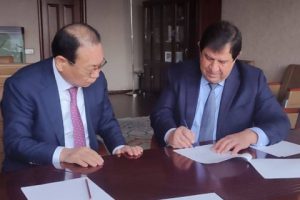 Kia Motors Representative Office to Open in Dushanbe
Kia Motors Representative Office to Open in Dushanbe Tajikistan Takes Measures to Protect Agro-biological and Genetic Resources
Tajikistan Takes Measures to Protect Agro-biological and Genetic Resources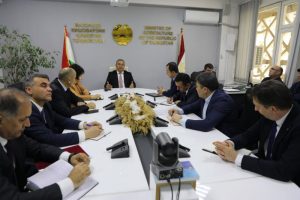 Construction of Three Agrological Centers Will Begin in Tajikistan in July
Construction of Three Agrological Centers Will Begin in Tajikistan in July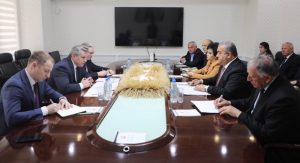 Tajikistan and Belarus Express Interest in Agricultural Cooperation
Tajikistan and Belarus Express Interest in Agricultural Cooperation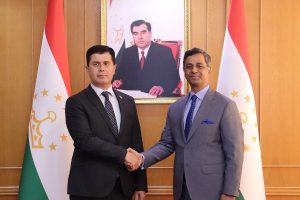 Foreign Trade Turnover Between Tajikistan and Pakistan Increases by 1.6 Times in 2023
Foreign Trade Turnover Between Tajikistan and Pakistan Increases by 1.6 Times in 2023 Tajikistan’s Deputy Premier Attends Meeting of the CIS Economic Council in Moscow
Tajikistan’s Deputy Premier Attends Meeting of the CIS Economic Council in Moscow Representatives of Tajikistan Attend Airspace World 2024 in Geneva
Representatives of Tajikistan Attend Airspace World 2024 in Geneva Tajik Minister of Transport and the President of the Russian Association of Concrete Roads Discuss Introduction of Road Laying Technologies
Tajik Minister of Transport and the President of the Russian Association of Concrete Roads Discuss Introduction of Road Laying Technologies DUSHANBE WATER PROCESS: UNICEF Plans to Establish a Youth for Water and Climate Network in Tajikistan
DUSHANBE WATER PROCESS: UNICEF Plans to Establish a Youth for Water and Climate Network in Tajikistan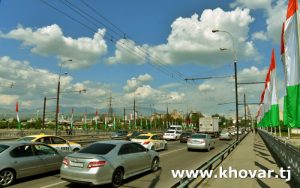 Number of Cars Increases in Tajikistan in Recent Years
Number of Cars Increases in Tajikistan in Recent Years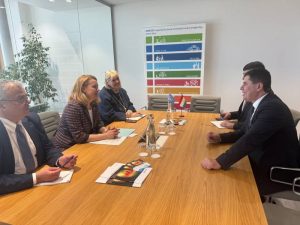 UNECE Will Provide Technical Assistance to Tajikistan in Preparation for SPECA Activities
UNECE Will Provide Technical Assistance to Tajikistan in Preparation for SPECA Activities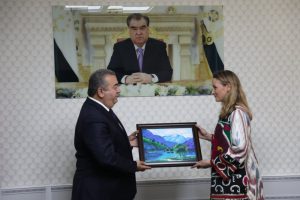 EU Is Interested in Cooperation with Tajikistan in the Agricultural Sector
EU Is Interested in Cooperation with Tajikistan in the Agricultural Sector













